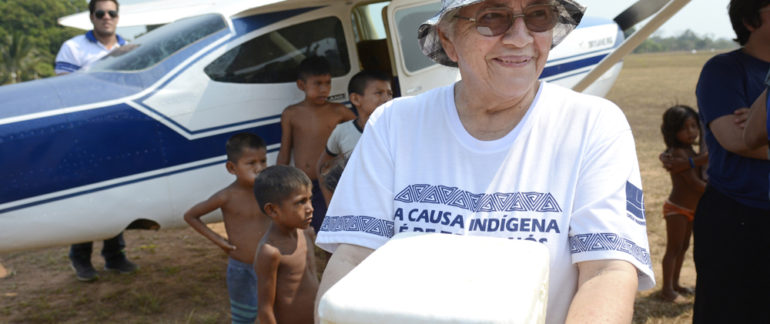The Custody of Saint Benedict of the Amazon reinforced its commitment to the Munduruku indigenous people by sending four friars to live and work with them in the Mission of St. Francis along the Cururu River deep in the Amazon jungle. Two friars are priests, the other two are friar students doing their pastoral experience. The following letter is written by Brother Erlison Campos as he began his work with the Munduruku people:
In February, four missionaries who make up the Fraternity of St. Francis Mission among the Mundurku people left the city of Santarém for the city of Itaituba: Fr. Joao Messias, Fr. Fábio Neto, and brothers Vagner Sena and myself. In Itaituba, known as the “Gold City”, Fr. Manoel received us and we spent the weekend meeting with the bishop and community leaders, celebrating and, mainly, having a fraternal visit.
Several days later, we left Itaituba for the city of Jacareacanga, a six to eight hour drive, depending on the conditions. During the rainy season, the road can be impassable as dirt turns to mud. But on this day, we were able to pass without much difficulty. That was not the case later that day as other travelers were bogged down by rain and mud and spent the night on the road.
In Jacareacanga the hostesses were the Passionists sisters, Irene and Inacia, and we were well taken care of during our three-day stay. During this time, we shopped for food, fixed the an outboard motor and made other necessary preparations for life in the Mission.
Three days later, in the early morning, we departed in a small boat with the repaired outboard motor in the direction of our new home. The trip, which lasted 17 hours, allowed us to watch the sunrise in the choppy waters of the Tapajós River and as night fell, the sunset in the tranquility of the Cururu River. Then the moon appeared and illuminated the paths of the river and drew our attention to the orange eyes of alligators watching our passage. What our eyes saw on our journey compensated for our fears and fatigue.
It was nearly midnight when we arrived at the Mission and Sisters Claudia and Conceicão were still awake to greet us. It was raining hard, yet they came to open the house and welcome their new neighbors. Exhausted, we strung up our hammocks and slept there on the porch. Early the next morning, as the sun came up, the little children were there watching us through the screens. Joy to all: the PAIM (Munduruku name for Friars) have arrived!
The first days were dedicated to cleaning and organizing the house and getting to know the people by making visits to families. Along with the sisters, we planned our common fraternal and pastoral activities. We eat lunch with the sisters every day and each one of us has to show how good he is at handling the stove. We celebrate Mass weekly. Recreation includes sometimes watching movies at night or fishing by day, although fishing is not solely for recreation but often to guarantee our lunch.
Life in the Mission is hectic. There is always someone calling for the PAIM with a request: a baptism, marriage, confession or visiting the sick and occasionally, a soccer game. Work is never lacking. The lawn mower was repaired, new solar energy plates were installed and the library, containing many books were organized. The house now has a refrigerator and a room was prepared to receive the Provincial on his visits.
During that first month, we visited almost all the villages of the Cururu River. High water from the rainy season makes our trips on the river faster. With these visits, it was possible to meet the leaders of each village and those responsible for Sunday celebrations. Special Franciscan calendars were given to each family. We became immersed in our new life with the people, making farinha, playing ball, and talking. In return, the Friars took home the feeling of being loved, a lot of coffee in the stomach and the offspring of a blue macaw, Dorothy and Daisy, which became part of our fraternity.
With the grace of God, all is well! We are very close to each other, to the sisters, the people and therefore to God. We are living in a “time of grace.” God has helped us to be faithful in this endeavor.

